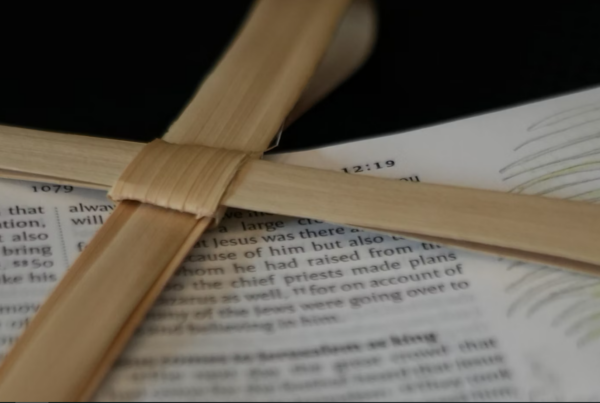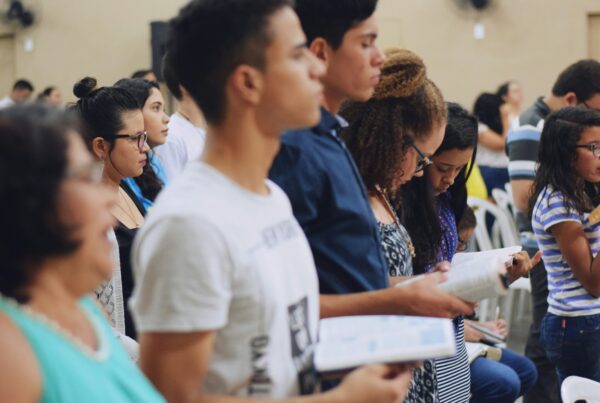O ften encouragement is hard to come by, especially when there’s so much transition, so many things you didn’t expect as a ministry leader, as a pastor. The past few years have thrown us all for a loop: the coronavirus, the racial unrest in the U.S., the political polarization of the U.S.—all of the things. And we as pastors sit in the center of that, trying to manage it in so many different ways. This is my encouragement for pastors and church leaders.
This material was originally recorded as part of the Renovations Project. It has been lightly edited and condensed for clarity.
You don’t need to be perfect
My encouragement is this, and it comes from one of my favorite stories in Scripture, which is the story of the woman at the well in John 4. There are a couple of things that Jesus does in this story that I think will help center you as you try to strap in for the long haul and really be encouraged in your pastoral role.
Once you’ve read through the passage, hear the woman’s response. This is what’s key to us as leaders as we hang on. She says to Jesus (and I’m paraphrasing), “How can you, a Jewish man, even speak to me, a Samaritan woman? What? You’re not even supposed to talk to me. You’re not even supposed to acknowledge my presence. How can you talk to me?”
And Jesus says, “Look, none of that really matters. As a matter of fact, there will come a time where it won’t matter where you worship, or how you worship, but that you do it in spirit and truth. That’s all that will matter.” And it says that Jesus goes on to continue to be in relationship with the woman, to love on her, to talk to her, to tell her about her shortcomings and her good ways, and to expose the brokenness in that society and how she had been a victim of the unjust society.
Jesus is telling the truth, but at the end of the day, it wasn’t Jesus’s sermons. It wasn’t Jesus having some eloquent exposition of Scripture. It wasn’t Jesus being the perfect pastor who never missed a home visit. It wasn’t Jesus who knew the answer to every question and knew how to counsel perfectly. It was Jesus being present, and there was a real exchange of human love that caused both Jesus to be able to go on with his ministry, and the woman to start hers. The passage says that she went back in town and said, “Let me tell you about this man named Jesus who knew me, who knew everything about me.”
So let me encourage you today. It’s not about being a perfect pastor. It’s not about crossing every t; it’s not about dotting every i. It’s not about having a perfect sermon plan. It’s not about having a five-point plan for how you’re going to run the church next year. It’s about sitting down at the feet of the Lord and saying, “I need you. I need the living water of the Lord to sustain me.”
We have got to get out of thinking that we have everything down. Jesus knew that he needed to go to Samaria, and I think there’s a reason that he went that we may never recognize. The reason that Jesus knew he needed to go to Samaria was because he knew that he could not combat the stereotype that this woman had of herself, that, “How can you a Jewish man, even speak to me, a Samaritan woman?” He couldn’t do that from a distance. He couldn’t do that by commuting back and forth to Samaria. He couldn’t do that by sharing a passage here and there. He had to be in her place, being with her, vulnerably sharing a relationship.
My encouragement to you is that you got to take your cape off. You’ve got to stop being the savior of your sanctuary and your congregation. You’ve got to be a person who needs Jesus just as much as your congregants do. You’ve got to fall in love with God and fall in love with your place and just do what Jesus has asked us to do. “Love the Lord your God, with all your heart, mind, soul, and strength, and love your neighbor as yourself” (Matthew 22:37). I would add if God’s calling you to love your neighbor, maybe you should love your neighborhood too.
Related: How a Church Can Love Its Neighborhood and Partner With Its Community
The gospel is holistic
Another important concept and another shift that I’m hoping that many of us have already made is this idea of reconnecting to the gospel in its totality. I call it reconnecting to the whole gospel. I’m not sure how we got to the point of believing that God is even overly concerned with our spiritual health in comparison to other areas of our life.
The only way we can actually fall prey to that notion is to bottle ourselves up in a space where we can only talk about the spiritual because all of the other areas of people’s lives are taken care of. So we can get ourselves as comfortable as possible in nice houses, not having to worry about money, and not having to worry about anything. Then we can just spend our time on eternity and what’s going to happen when we get to heaven. Since we already live in heaven on earth, we don’t have to worry about it.
Related: “Your Kingdom Come, Your Will Be Done, on Earth as in Heaven” | The Lord’s Prayer Petition 2
But when you get into a context where people’s everyday realities are one of disenfranchisement, or one of neglect, or one of disappointment in the systems around them, then to hear God say to you, “I know that you don’t have food to eat right now, I know you’re struggling with how you going to pay rent, I know that you’re wondering if your kids are getting a good education, I know you’re worried about the violence in your neighborhood, but you are alright because I gave you an eternal resting place in heaven. You’ll be good when you get there.” These are not the words from a loving God.
I tell people that, while that is good news, it isn’t good enough news for me—to tell me that I got an eternity in heaven someday. That God isn’t thinking about me today is not good news. But I don’t believe that’s the gospel. The gospel is a holistic one, and I believe that the God of the gospel, that Jesus, when he was on the cross, was dying not only to save our souls, but also to save us in our entirety—mentally, physically, and spiritually. All of the ways in which we are wired, God is intimately concerned with and is restoring and reclaiming so that we become fully human. I want us to make sure that we reconnect to that.
I jokingly tell this story: what if I was in a burning building, and a firefighter ran into the building and saw me, and the fire was coming and said, “I see you, but I need your soul, where’s your soul? I need your soul. I want to save it.” And walked out of there and left my body and took my soul. We would all think, “What’s going on with this firefighter?” We would think that he’s crazy.
But for some reason, we think that God wants to come and save our souls and couldn’t care less about our bodies—that they should be left. We misappropriate the language of Scripture and look at our bodies as something to be neglected. Jesus, when he ascended to heaven in Acts, he must have left his body on the third cloud up or something. No, we serve an embodied Savior who understands and is on the right hand of the Father making petition on behalf of us in our embodied selves. Which means that when we talk about the gospel, when we talk about salvation, when we talk about how God loves us, we must say that God is concerned about all of us.
So, that will take you away from saying stuff like, “I don’t see color.” Yes, you do because it’s right there; it’s a part of who God made me to be, and you do see my color. I want you to celebrate the fact that I’m a different color than you, but I don’t want you to create systems around my color that make me less of a person because of it. I don’t want you to ignore it, just like I don’t want to ignore the color of your eyes or the curl of your lips. All of it is sacred and beautiful because it is created by God, and God is concerned about it all.
So when we start talking about what that means for us in the future, it means that when we recognize that God is concerned about the totality of humanity, and the totality of the world, that the gospel is much bigger than what our eternal resting place will be. That we can do more than sing songs like “I’ll Fly Away.” Those songs get the church up, we are clapping, we are happy, but they are all about what’s going to happen someday yonder. What can God do now?
Be builders, not just dismantlers
If you want to know what it looks like to build something that will impact society and will impact the younger generation that we’re trying to get into the church, then you’ve got to create an idea that says that God is intimately concerned about right now. God is concerned that people find themselves disenfranchised. God is concerned and upset that George Floyd laid on the ground with a knee on his neck for 8 minutes and 46 seconds. God is concerned about what’s going on in our world now. Therefore, we should be too.
It’s easy to complain; we know how to complain about what’s wrong. I don’t want you to spend all of your time just dismantling what’s broken. It does need to be dismantled—broken systems, broken ways of doing things, old ways. But I live in a neighborhood where I know all too well what it looks like for things to be torn down without any plan for how they’re going to be rebuilt. I’ll tell you right now, it leaves a lot of vacant lots.
So if we, as the church, are going to dismantle, then we’ve got to be able to also simultaneously build. Let’s stop asking what’s wrong with the church all the time, and maybe sit down with a group of young people and say, “What is the church you’ve always dreamed of being a part of?” Those conversations are much different than, “What’s wrong with the church you’re a part of now?” Let’s reconnect to the whole gospel, and let’s be builders, not just dismantlers.

Renew your church’s imagination for ministry
The Renovations Project helps leaders learn, together.
- Thought-provoking masterclasses
- Personalized coaching
- Immersive visit to a ministry innovation hub
- Ministry innovation grants up to $5,000

Jonathan Brooks
Jonathan “Pastah J” Brooks is a pastor, speaker, writer, artist, and community activist. A lifelong resident of the Chicago area, he is a firm believer in investing in your local community. After serving as senior pastor of Canaan Community Church in the West Englewood neighborhood, he is now co-lead pastor at Lawndale Christian Community Church in the North Lawndale Neighborhood. He participated in listening sessions about innovation hosted by the Reformed Church in America.



